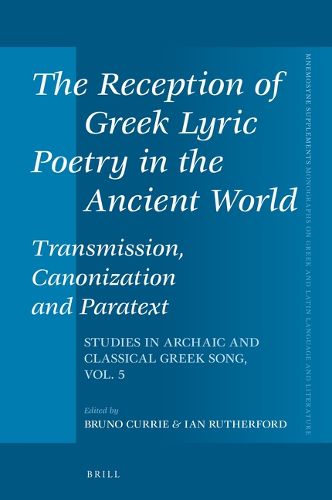Readings Newsletter
Become a Readings Member to make your shopping experience even easier.
Sign in or sign up for free!
You’re not far away from qualifying for FREE standard shipping within Australia
You’ve qualified for FREE standard shipping within Australia
The cart is loading…






In The Reception of Greek Lyric Poetry in the Ancient World: Transmission, Canonization and Paratext, a team of international scholars consider the afterlife of early Greek lyric poetry (iambic, elegiac, and melic) up to the 12th century CE, from a variety of intersecting perspectives: reperformance, textualization, the direct and indirect tradition, anthologies, poets’ Lives, and the disquisitions of philosophers and scholars. Particular attention is given to the poets Tyrtaeus, Solon, Theognis, Sappho, Alcaeus, Stesichorus, Pindar, and Timotheus. Consideration is given to their reception in authors such as Aristophanes, Herodotus, Plato, Plutarch, Athenaeus, Aelius Aristides, Catullus, Horace, Virgil, Ovid, and Statius, as well as their discussion by Peripatetic scholars, the Hellenistic scholia to Pindar, Horace’s commentator Porphyrio, and Eustathius on Pindar.
$9.00 standard shipping within Australia
FREE standard shipping within Australia for orders over $100.00
Express & International shipping calculated at checkout
In The Reception of Greek Lyric Poetry in the Ancient World: Transmission, Canonization and Paratext, a team of international scholars consider the afterlife of early Greek lyric poetry (iambic, elegiac, and melic) up to the 12th century CE, from a variety of intersecting perspectives: reperformance, textualization, the direct and indirect tradition, anthologies, poets’ Lives, and the disquisitions of philosophers and scholars. Particular attention is given to the poets Tyrtaeus, Solon, Theognis, Sappho, Alcaeus, Stesichorus, Pindar, and Timotheus. Consideration is given to their reception in authors such as Aristophanes, Herodotus, Plato, Plutarch, Athenaeus, Aelius Aristides, Catullus, Horace, Virgil, Ovid, and Statius, as well as their discussion by Peripatetic scholars, the Hellenistic scholia to Pindar, Horace’s commentator Porphyrio, and Eustathius on Pindar.